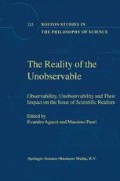Abstract
It is commonly thought that the birth of modern natural science was made possible by an intellectual shift from a mainly abstract and speculative conception of the world to a carefully elaborated image based on observations. There is some grain of truth in this claim, but this grain depends very much on what one takes observation to be. In the philosophy of science of our century, observation has been practically equated with sense perception. This is understandable if we think of the attitude of radical empiricism that inspired Ernst Mach and the philosophers of the Vienna Circle, who powerfully influenced our century’s philosophy of science. However, this was not the attitude of the founders of modern science: Galileo, for example, expressed in a famous passage of the Assayer the conviction that perceptual features of the world are merely subjective, and are produced in the ‘animal’ by the motion and impacts of unobservable particles that are endowed uniquely with mathematically expressible properties, and which are therefore the real features of the world. Moreover, on other occasions, when defending the Copernican theory, he explicitly remarked that in admitting that the Sun is static and the Earth turns on its own axis, ‘ reason must do violence to the sense’, and that it is thanks to this violence that one can know the true constitution of the universe.
Access this chapter
Tax calculation will be finalised at checkout
Purchases are for personal use only
Preview
Unable to display preview. Download preview PDF.
Author information
Authors and Affiliations
Editor information
Editors and Affiliations
Rights and permissions
Copyright information
© 2000 Springer Science+Business Media Dordrecht
About this chapter
Cite this chapter
Agazzi, E., Pauri, M. (2000). Introduction. In: Agazzi, E., Pauri, M. (eds) The Reality of the Unobservable. Boston Studies in the Philosophy of Science, vol 215. Springer, Dordrecht. https://doi.org/10.1007/978-94-015-9391-5_1
Download citation
DOI: https://doi.org/10.1007/978-94-015-9391-5_1
Publisher Name: Springer, Dordrecht
Print ISBN: 978-90-481-5458-6
Online ISBN: 978-94-015-9391-5
eBook Packages: Springer Book Archive

